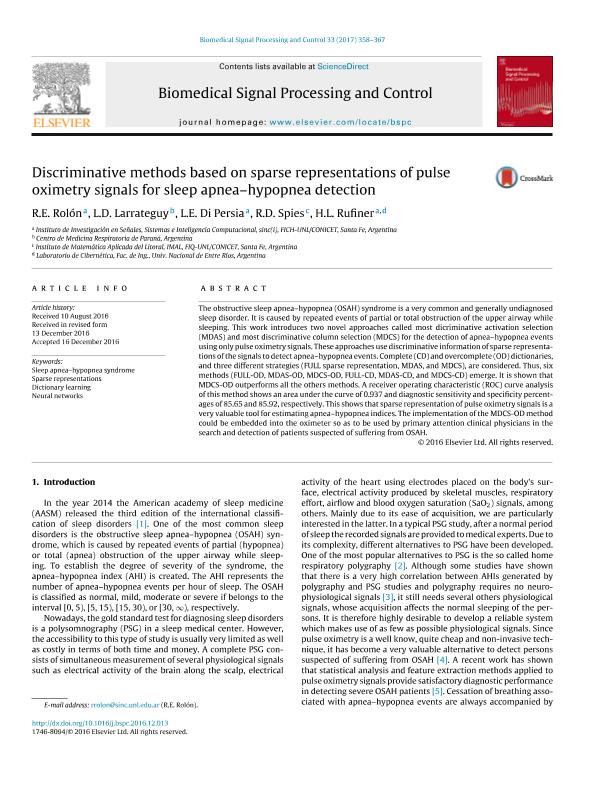Mostrar el registro sencillo del ítem
dc.contributor.author
Rolon, Roman Emanuel

dc.contributor.author
Larrateguy, Luis Darío
dc.contributor.author
Di Persia, Leandro Ezequiel

dc.contributor.author
Spies, Ruben Daniel

dc.contributor.author
Rufiner, Hugo Leonardo

dc.date.available
2018-06-01T20:45:53Z
dc.date.issued
2017-03
dc.identifier.citation
Rolon, Roman Emanuel; Larrateguy, Luis Darío; Di Persia, Leandro Ezequiel; Spies, Ruben Daniel; Rufiner, Hugo Leonardo; Discriminative methods based on sparse representations of pulse oximetry signals for sleep apnea–hypopnea detection; Elsevier; Biomedical Signal Processing and Control; 33; 3-2017; 358-367
dc.identifier.issn
1746-8094
dc.identifier.uri
http://hdl.handle.net/11336/47063
dc.description.abstract
The obstructive sleep apnea?hypopnea (OSAH) syndrome is a very common and generally undiagnosed sleep disorder. It is caused by repeated events of partial or total obstruction of the upper airway while sleeping. This work introduces two novel approaches called most dicriminative activation selection (MDAS) and most discriminative column selection (MDCS) for the detection of apnea?hypopnea events using only pulse oximetry signals. These approaches use discriminative information of sparse representations of the signals to detect apnea?hypopnea events. Complete (CD) and overcomplete (OD) dictionaries, and three different strategies (FULL sparse representation, MDAS, and MDCS), are considered. Thus, six methods (FULL-OD, MDAS-OD, MDCS-OD, FULL-CD, MDAS-CD, and MDCS-CD) emerge. It is shown that MDCS-OD outperforms all the others methods. A receiver operating characteristic (ROC) curve analysis of this method shows an area under the curve of 0.937 and diagnostic sensitivity and specificity percentages of 85.65 and 85.92, respectively. This shows that sparse representation of pulse oximetry signals is a very valuable tool for estimating apnea?hypopnea indices. The implementation of the MDCS-OD method could be embedded into the oximeter so as to be used by primary attention clinical physicians in the search and detection of patients suspected of suffering from OSAH.
dc.format
application/pdf
dc.language.iso
eng
dc.publisher
Elsevier

dc.rights
info:eu-repo/semantics/openAccess
dc.rights.uri
https://creativecommons.org/licenses/by-nc-sa/2.5/ar/
dc.subject
Sleep Apneahypopnea Syndrome
dc.subject
Sparse Representations
dc.subject
Dictionary Learning
dc.subject
Neural Networks
dc.subject.classification
Ingeniería de Sistemas y Comunicaciones

dc.subject.classification
Ingeniería Eléctrica, Ingeniería Electrónica e Ingeniería de la Información

dc.subject.classification
INGENIERÍAS Y TECNOLOGÍAS

dc.title
Discriminative methods based on sparse representations of pulse oximetry signals for sleep apnea–hypopnea detection
dc.type
info:eu-repo/semantics/article
dc.type
info:ar-repo/semantics/artículo
dc.type
info:eu-repo/semantics/publishedVersion
dc.date.updated
2018-05-31T18:18:36Z
dc.journal.volume
33
dc.journal.pagination
358-367
dc.journal.pais
Países Bajos

dc.journal.ciudad
Amsterdam
dc.description.fil
Fil: Rolon, Roman Emanuel. Consejo Nacional de Investigaciones Científicas y Técnicas. Centro Científico Tecnológico Conicet - Santa Fe. Instituto de Investigación en Señales, Sistemas e Inteligencia Computacional. Universidad Nacional del Litoral. Facultad de Ingeniería y Ciencias Hídricas. Instituto de Investigación en Señales, Sistemas e Inteligencia Computacional; Argentina
dc.description.fil
Fil: Larrateguy, Luis Darío. Centro de Medicina Respiratoria; Argentina
dc.description.fil
Fil: Di Persia, Leandro Ezequiel. Consejo Nacional de Investigaciones Científicas y Técnicas. Centro Científico Tecnológico Conicet - Santa Fe. Instituto de Investigación en Señales, Sistemas e Inteligencia Computacional. Universidad Nacional del Litoral. Facultad de Ingeniería y Ciencias Hídricas. Instituto de Investigación en Señales, Sistemas e Inteligencia Computacional; Argentina
dc.description.fil
Fil: Spies, Ruben Daniel. Consejo Nacional de Investigaciones Científicas y Técnicas. Centro Científico Tecnológico Conicet - Santa Fe. Instituto de Matemática Aplicada del Litoral. Universidad Nacional del Litoral. Instituto de Matemática Aplicada del Litoral; Argentina
dc.description.fil
Fil: Rufiner, Hugo Leonardo. Consejo Nacional de Investigaciones Científicas y Técnicas. Centro Científico Tecnológico Conicet - Santa Fe. Instituto de Investigación en Señales, Sistemas e Inteligencia Computacional. Universidad Nacional del Litoral. Facultad de Ingeniería y Ciencias Hídricas. Instituto de Investigación en Señales, Sistemas e Inteligencia Computacional; Argentina. Universidad Nacional de Entre Ríos; Argentina
dc.journal.title
Biomedical Signal Processing and Control

dc.relation.alternativeid
info:eu-repo/semantics/altIdentifier/url/http://www.sciencedirect.com/science/article/pii/S1746809416302257
dc.relation.alternativeid
info:eu-repo/semantics/altIdentifier/doi/https://doi.org/10.1016/j.bspc.2016.12.013
Archivos asociados
